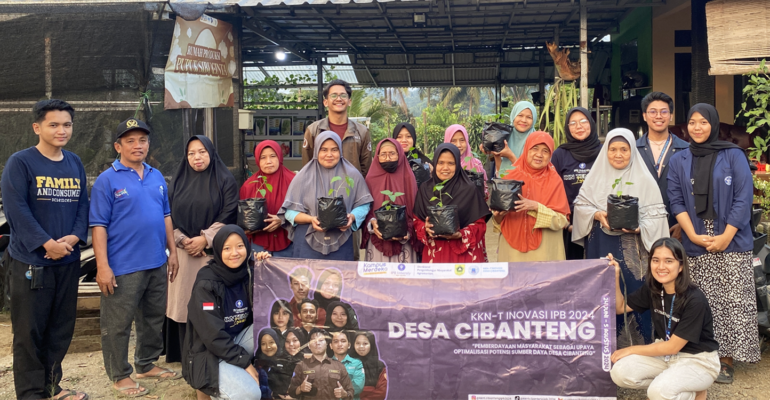Together with Cibanteng Village Residents, IPB University Innovation Real-Thematic Work Lecture (KKNT) Team Holds Yard Plant Nursery

Students of the IPB University Innovation Real Thematic Work Lecture (KKNT) Group conducted socialization activities on the use of yard plants and plant seeding practices at the CV Alam Mandiri Seedling Garden in Cibanteng Village, Ciampea District, Bogor Regency, West Java.
The yard plants used were cayenne pepper Capsicum frutescens L.. According to Putri Naila Khairunnisa Hermawan, one of the KKNT Innovation team members, cayenne pepper was chosen because it is easy to care for, does not require much space, and is often used in daily cooking. In addition, planting cayenne pepper can also save costs and ensure the availability of fresh kitchen spices.
A few weeks earlier, the KKNT Innovation Cibanteng Village team had planted chilli seeds at the IPB Dramaga campus as a first step to implementing the yard plant seedling program.
“First of all, a bag of seeds is dipped in water. Seeds that sink are usually healthy and suitable for planting, while seeds that float will most likely not grow,” said Putri when explaining the seeding process to the villagers.
She continued, the sunken seeds are filtered and then planted on a tray that has been filled with a mixture of soil, husk charcoal, and compost in a ratio of 1:1:1. The planted seeds are placed in a shady spot and watered daily. “After reaching the age of 21-24 days or 3-4 leaves appear, the chilli seedlings are ready to be transferred from the tray into polybags,” she said.
When transplanting the seedlings into polybags, Cibanteng Village residents participated in the activity. The residents, who were dominated by the housewives, looked very enthusiastic when moving the chilli seeds from the tray into the polybag which had also been filled with a mixture of soil, husk charcoal, and compost. They were also given education on how to plant and care for chilli plants effectively and efficiently to get the best results.
With the program to plant yard plants in Cibanteng Village, the KKNT Inovasi team hopes that local residents can improve air quality, reduce heat, and increase the beauty and comfort of the home environment.
In addition, Putri said, by choosing chilli plants as yard plants, it is hoped that residents can get fresh food that is environmentally friendly and pesticide-free, save costs, and support food security. (*/Rz) (IAAS/Aly)



